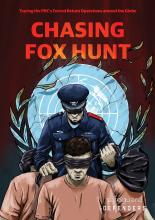Sourced from PRC propaganda, the stories of those individuals form the backbone of this report: from clandestine police visits abroad, to honey traps and location-revealing malware. Little detail is spared to describe the mechanics of these illicit operations.
We hope they may provide further public insight into the methodology that underpins the PRC’s long-arm policing efforts.
There are important lessons to be learned from these insights, as the exact same methods are constantly being discerned in overseas efforts against regime critics and political and religious minorities.
A vital part of the PRC’s long-arm policing efforts rest on the cooperation many authorities around the world continue to afford the Chinese authorities. While some have woken up to the dire reality of the CCP’s global fugitive hunt, others tacitly close an eye to or willingly assist in their unlawful operations under a recent swathe of - often secretive - police cooperation agreements.
Incredibly worrisome in that regard is the support provided by the UN Office on Drugs and Crime (UNODC) to the lead Chinese Communist Party-agency that authored the written legal interpretation around which this report is centered.
UNODC has repeatedly refused to release the terms of the Memorandum of Understanding it signed with the National Commission of Supervision of the Central Commission for Discipline Inspection in October 2019. This report publishes the integral document and lays out the case against UNODC’s cooperation on the basis of the mandatory UN Human Rights Due Diligence Policy enacted by former UN Secretary General Ban Ki Moon.
**
This report will soon be made available in simplified Chinese and Spanish.




